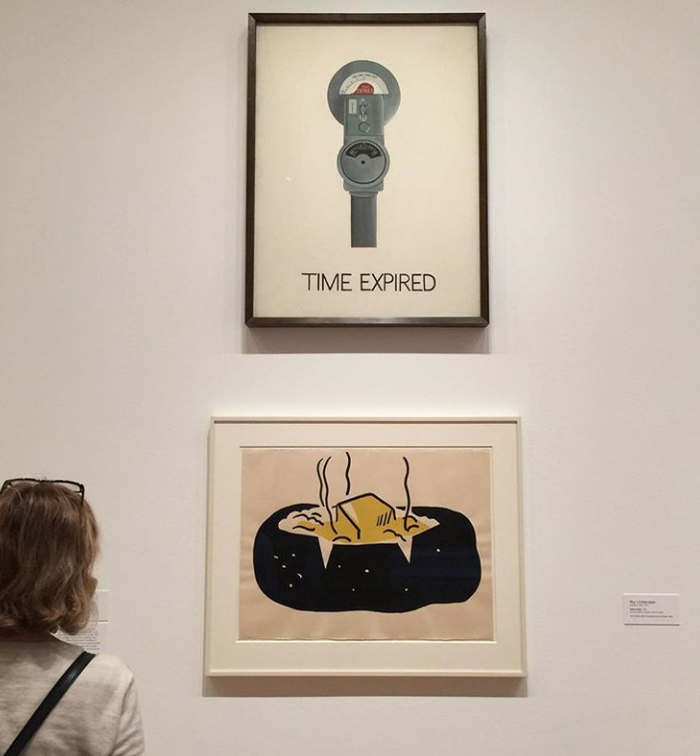Close Encounters of the Artistic Kind
Columnist Piper Whitehead gets into detail in her exploration of the link between aliens and art

The year is 1964. You and two friends decide to go for a walk in Cape Cod, when, suddenly, you see a strange object in the sky. You report it to the National Guard, and they do nothing. Obviously. I’m going to go out on a limb and say that most people believe there is some form of intelligent life out there in our infinite universe; scepticism usually kicks in about whether aliens consider Earth a one-stop scientific resource/tourism destination. Anyway, your interest is piqued, you begin to research, to publish your ideas and before long, more and more people are contacting you about their experiences with aliens. You’re also the acclaimed abstract artist Budd Hopkins, but everyone needs a hobby.
“We don’t romanticise claims of alien encounters in the irresponsible way we often do with artists’ mental illnesses”
Hopkins claims to have been an alien sceptic ever since being one of the many listeners who were traumatised by Orson Welles’ The War of the Worlds, history’s most unethical radio play, which is best known for making lots of people think aliens were actually invading the earth. So Hopkins clearly knew the danger of hoaxes, but even he was eventually convinced that the danger of actual aliens was much more worrisome. He went on to dedicate significant portions of his time to researching aliens and supporting victims of supposed abductions.
What I find most compelling about Hopkin’s experience is that it was never something he claimed to represent in his art. Though some people have found his later sculptures quite alien-like, it would be remiss to write an article about extraterrestrial experiences that doesn’t acknowledge the fact that people usually see what they want to see. Still, claims of alien encounters seem to have been detrimental to the career of a respected abstract expressionist, with works held by the likes of Met and MoMA. It certainly dominated his Wikipedia page.
Blatant liars are always around to attach themselves parasitically to any good mystery, invariably for profit. In 2015, British painter Lloyd Canning claimed he was visited by aliens numerous times and that his works were the result of their projections into his mind. A few months later he then announced it was a lie for exposure, and he’d never been abducted, though he had had ‘great sightings’. I don’t think many people were shocked. Perhaps the most questionable part of his story was why aliens thought the psychedelic dreamscapes Canning painted needed to be urgently communicated to earthlings. Personally, I find his paintings the least interesting of those I examined for this article. Then again, that might be my expectations at play. They do say that money is the enemy of good art.
There are also stories of artists encountering aliens that might challenge even the most tin-foil hat-friendly of us. David Huggins, the subject of documentary Love and Saucers, claims to have been visited by aliens for most of his life. What’s more, he claims to have lost his virginity to an alien named Crescent, who continued to visit him throughout his life, and with whom he fathered alien-human hybrids. Unlike Hopkins, Huggins actually did use these encounters as the basis for his art (as you might guess, they get erotic – don’t say I didn’t warn you). His works are eerie and unsettling, often showing himself, Crescent, and others in blank interior environments. Does the fact that the aliens in his paintings resemble ‘greys’, the most stereotypical image of an alien, make it more or less likely that he actually saw them? Does the sheer outrageousness of it all make the story more believable than a defensible lie, like seeing something in the sky? Though his narrative beggars belief, those who have met or seen interviews with Huggins find him compelling. He does not give the impression of a liar.
Perhaps Huggins and Hopkins are just crazy. We tend to treat people who search for UFOs as quacks, eccentrics and outcasts (after all, if you weren’t an outcast before, telling people you’ve seen aliens certainly puts you on the fast track to becoming one). We don’t romanticise claims of alien encounters in the irresponsible way we often do with artists’ mental illnesses. However, there are a number of crossovers between truth seekers and those we call great artists: they’re unusually perceptive, they question the intent of institutions like governments, and they’re willing to say things that the rest of us are afraid to. Perhaps most importantly, both groups have the tendency to wander about in isolated areas. The edge of reason has always been well populated by artists, philosophers and avant-garde types. Maybe they’re the only ones willing to see what we don’t want to.
 Comment / Plastic pubs: the problem with Cambridge alehouses 5 January 2026
Comment / Plastic pubs: the problem with Cambridge alehouses 5 January 2026 News / Cambridge academics stand out in King’s 2026 Honours List2 January 2026
News / Cambridge academics stand out in King’s 2026 Honours List2 January 2026 News / Cambridge businesses concerned infrastructure delays will hurt growth5 January 2026
News / Cambridge businesses concerned infrastructure delays will hurt growth5 January 2026 News / AstraZeneca sues for £32 million over faulty construction at Cambridge Campus31 December 2025
News / AstraZeneca sues for £32 million over faulty construction at Cambridge Campus31 December 2025 Interviews / You don’t need to peak at Cambridge, says Robin Harding31 December 2025
Interviews / You don’t need to peak at Cambridge, says Robin Harding31 December 2025










